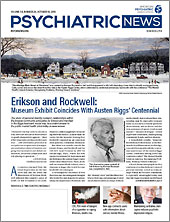In a joint statement issued last month, APA and five other medical organizations urged the Centers for Medicare and Medicaid Services (CMS) to withdraw a proposed rule that would greatly reduce the federal government’s role in ensuring that Medicaid patients have adequate access to care.
The rule, proposed in July, would rescind the requirement implemented in 2015 that states develop Access Monitoring Review Plans (AMRPs), which must be updated every three years and submitted to CMS. The plans require states to review access to care within their fee-for-service (FFS) Medicaid programs, while also creating a process through which the public can provide input on whether patients have adequate access to care.
“Stakeholders, like states, the federal government, providers, and patients, need more information to evaluate whether there is acceptable access in the Medicaid program, not less,” wrote APA and its partners: the American Academy of Family Physicians, American Academy of Pediatrics, American College of Obstetricians and Gynecologists, American College of Physicians, and the American Osteopathic Association. Together, they represent more than 590,000 physicians and medical students. The organizations noted that removing the requirement that states create AMRPs “would greatly reduce transparency regarding access in Medicaid FFS, which continues to serve some of the most vulnerable populations in the Medicaid program.”
“Transparency of state reimbursement policies is crucial to ensuring an adequate workforce of skilled clinicians to treat patients in Medicaid,” said APA President Bruce Schwartz, M.D. “We need to strengthen access-monitoring regulations and guarantee there are safeguards that keep both the physician and the patient involved in the process.”
“The proposed rule could allow further cuts to Medicaid fees that would leave patients, including those with serious mental illness, with reduced access to the care they need,” said APA CEO and Medical Director Saul Levin, M.D., M.P.A.
APA and its partners argued that the change would “abdicate the federal government’s responsibility to monitor access to care for patients enrolled in Medicaid.” Without adequate oversight, it could be easier for states to cut payment rates, potentially resulting in fewer physicians participating in Medicaid or health care professionals limiting the number of Medicaid patients they accept.
“Multiple data sources show that payment is the primary driver in determining physician participation in the Medicaid program, and the proposed rule could lead to increasingly insufficient Medicaid payment rates, seriously jeopardizing patients’ ability to access health services,” the organizations pointed out.
The joint statement especially stresses the importance of allowing public input, particularly when it comes to potentially significant changes to payment rates: “In addition to removing the patient and provider voice from the decision-making process, such a change could eliminate essential qualitative data and testimonials from providers and beneficiaries that inform which services need to be monitored. ■
The joint statement is posted
here. The proposed rule is posted in the Federal Register
here.
